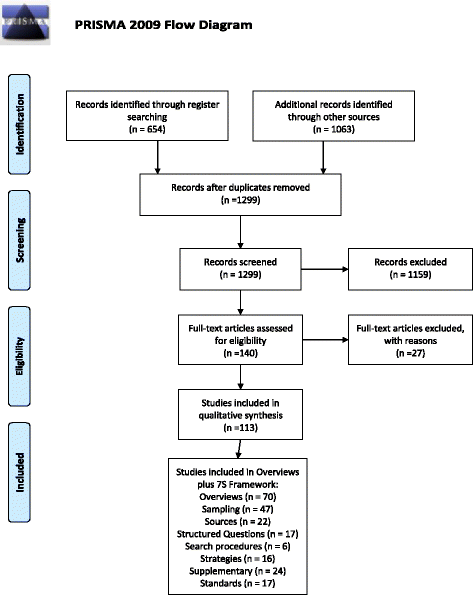Searching for qualitative research for inclusion in systematic reviews: a structured methodological review
- PMID: 27145932
- PMCID: PMC4855695
- DOI: 10.1186/s13643-016-0249-x
Searching for qualitative research for inclusion in systematic reviews: a structured methodological review
Abstract
Background: Qualitative systematic reviews or qualitative evidence syntheses (QES) are increasingly recognised as a way to enhance the value of systematic reviews (SRs) of clinical trials. They can explain the mechanisms by which interventions, evaluated within trials, might achieve their effect. They can investigate differences in effects between different population groups. They can identify which outcomes are most important to patients, carers, health professionals and other stakeholders. QES can explore the impact of acceptance, feasibility, meaningfulness and implementation-related factors within a real world setting and thus contribute to the design and further refinement of future interventions. To produce valid, reliable and meaningful QES requires systematic identification of relevant qualitative evidence. Although the methodologies of QES, including methods for information retrieval, are well-documented, little empirical evidence exists to inform their conduct and reporting.
Methods: This structured methodological overview examines papers on searching for qualitative research identified from the Cochrane Qualitative and Implementation Methods Group Methodology Register and from citation searches of 15 key papers.
Results: A single reviewer reviewed 1299 references. Papers reporting methodological guidance, use of innovative methodologies or empirical studies of retrieval methods were categorised under eight topical headings: overviews and methodological guidance, sampling, sources, structured questions, search procedures, search strategies and filters, supplementary strategies and standards.
Conclusions: This structured overview presents a contemporaneous view of information retrieval for qualitative research and identifies a future research agenda. This review concludes that poor empirical evidence underpins current information practice in information retrieval of qualitative research. A trend towards improved transparency of search methods and further evaluation of key search procedures offers the prospect of rapid development of search methods.
Keywords: Literature searching; Qualitative research; Systematic reviews.
Similar articles
-
Folic acid supplementation and malaria susceptibility and severity among people taking antifolate antimalarial drugs in endemic areas.Cochrane Database Syst Rev. 2022 Feb 1;2(2022):CD014217. doi: 10.1002/14651858.CD014217. Cochrane Database Syst Rev. 2022. PMID: 36321557 Free PMC article.
-
The future of Cochrane Neonatal.Early Hum Dev. 2020 Nov;150:105191. doi: 10.1016/j.earlhumdev.2020.105191. Epub 2020 Sep 12. Early Hum Dev. 2020. PMID: 33036834
-
Methodological developments in searching for studies for systematic reviews: past, present and future?Syst Rev. 2013 Sep 25;2:78. doi: 10.1186/2046-4053-2-78. Syst Rev. 2013. PMID: 24066664 Free PMC article.
-
Search strategies to identify diagnostic accuracy studies in MEDLINE and EMBASE.Cochrane Database Syst Rev. 2013 Sep 11;2013(9):MR000022. doi: 10.1002/14651858.MR000022.pub3. Cochrane Database Syst Rev. 2013. PMID: 24022476 Free PMC article. Review.
-
Searching and reporting in Campbell Collaboration systematic reviews: A systematic assessment of current methods.Campbell Syst Rev. 2024 Aug 21;20(3):e1432. doi: 10.1002/cl2.1432. eCollection 2024 Sep. Campbell Syst Rev. 2024. PMID: 39176233 Free PMC article. Review.
Cited by
-
Adult day programs and their effects on individuals with dementia and their caregivers (ADAPT-DemCare): a realist synthesis to develop program theories on the how and why.Syst Rev. 2024 Oct 23;13(1):265. doi: 10.1186/s13643-024-02683-1. Syst Rev. 2024. PMID: 39443968 Free PMC article.
-
Older Adults' Experiences With Using Wearable Devices: Qualitative Systematic Review and Meta-synthesis.JMIR Mhealth Uhealth. 2021 Jun 3;9(6):e23832. doi: 10.2196/23832. JMIR Mhealth Uhealth. 2021. PMID: 34081020 Free PMC article.
-
Criteria for the procedural fairness of health financing decisions: a scoping review.Health Policy Plan. 2023 Nov 14;38(Supplement_1):i13-i35. doi: 10.1093/heapol/czad066. Health Policy Plan. 2023. PMID: 37963078 Free PMC article.
-
The role of Qishen Yiqi dripping pills in treating chronic heart failure: An overview of systematic reviews and meta-analyses.Front Cardiovasc Med. 2022 Oct 24;9:1001072. doi: 10.3389/fcvm.2022.1001072. eCollection 2022. Front Cardiovasc Med. 2022. PMID: 36352851 Free PMC article.
-
Older adults' experiences during the COVID-19 pandemic: a qualitative systematic literature review.BMC Geriatr. 2023 Sep 20;23(1):580. doi: 10.1186/s12877-023-04282-6. BMC Geriatr. 2023. PMID: 37730571 Free PMC article.
References
-
- Noyes J. Never mind the qualitative feel the depth! The evolving role of qualitative research in Cochrane intervention reviews. J Res Nurs. 2010;15:525. doi: 10.1177/1744987110381696. - DOI
-
- Noblit GW, Hare RD. Meta-ethnography: synthesizing qualitative studies. Newbury Park: Sage; 1988.
Publication types
MeSH terms
LinkOut - more resources
Full Text Sources
Other Literature Sources


